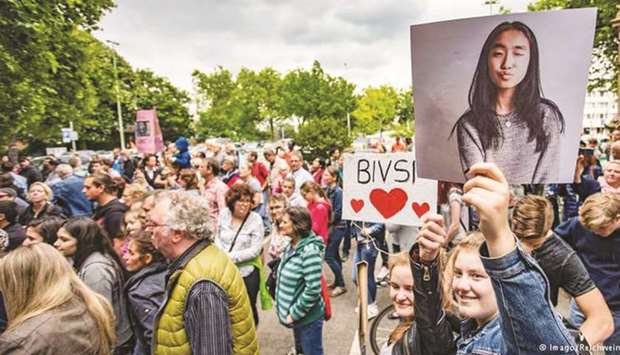Tears were flowing when schoolgirl Bivsi emerged from Dusseldorf airport yesterday.
Two months earlier, the German-born girl was deported from the German city of Duisburg to Nepal, her parents’ home country - a place she had never seen nor barely knew its language.
Then, after weeks of protests and petitions by her fellow high school students, teachers and politicians, what initially seemed impossible was reversed: 15-year-old Bivsi and her parents were allowed to
return to Germany.
At the airport, a dozen classmates were awaiting with pink heart-lined banners with this greeting: “Welcome back Bivsi, Bhim and Shrimaya.”
Everyone was at a loss for words, but there were plenty of hugs, especially from her friends - Sara from Afghanistan, Rosemarie from Vietnam and Marcia from Angola. All of them students in the 9d class of a high school in central
Duisburg.
“We are a bit proud that we accomplished this,” Sara said about the petition campaign.
Another classmate, Nico, who has Italian roots, added, “Our class is a community where everyone is treated equally.”
School director Ralf Buchthal also had a warm welcome for Bivsi.
“Staying persistent is what brought about this success,” he said.
Bivsi’s class, in which about half the students have an immigrant background, is an example of integration in Duisburg, a city in western Germany’s Ruhr industrial region. Regarded as an impoverished former steel town with a high percentage of immigrants, the city is struggling with its
negative image.
The classmates were the first to protest when on May 29 Bivsi was hauled out of a classroom and then, with her parents, placed on a flight to
Kathmandu, 7,000km away.
The deportation was legal. Her father, escaping the civil war in Nepal 20 years ago, made one mistake. Fearing possible political persecution later, he gave a false identity to German authorities.
“It was my only mistake,” he said in a report broadcast by local broadcaster WDR. Otherwise he worked full-time in Germany, paid his taxes and contributions to the state pension fund. But when he was caught out and authorities moved to deport the family, at every stage of the way the deportation
was ruled to be legal.
“They [the authorities] stuck to the legal rules,” said Eva Selic, a representative of the parents. “But it just felt wrong.”
Bivsi, and above all her parents, got lucky, many of their supporters will say. Only rarely is a deportation rescinded.
“That we also got the parents back is something we weren’t counting on,” Selic said.
Bivsi was allowed back under a school exchange visa. For humanitarian reasons her parents were allowed to accompany her. Instead of being an applicant for asylum, she will return to the classroom as an exchange
student.
After her graduation diploma she can file a follow-up application should she wish to pursue job training or to study further. Her parents may stay with her for as long as that takes.
Yesterday, nobody wanted to ponder what bureaucratic obstacles must be navigated in the next three years.
At the airport was also Bivsi’s brother Biswash, 22, who recently arrived in Germany. He had been raised in Nepal by his grandparents and relatives and now plans to study in Germany.
Biswash already speaks German. And he has the keys to the family’s Duisburg apartment.
The landlord had kept the flat free for the family, just in case.
Nepalese teenager Bivsi’s classmates staged rallies in support of the German-born girl in Duisburg, 548km from Berlin.

DEPORTED
